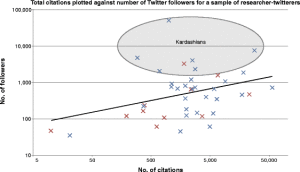"I am concerned that phenomena similar to that of Kim Kardashian may also exist in the scientific community. I think it is possible that there are individuals who are famous for being famous."
Writing in Genome Biology, Professor Neil Hall of the University of Liverpool suggests that too many researchers get invited to present at scientific conferences due to their public profile, rather than their academic standing. To help quantify this potential disconnect, Hall compares the number of followers a research scientist has on twitter with the number of citations they have for their peer-reviewed work. The ratio of the two measures is called the "Kardashian Index":

If your number of twitter followers is more than 5X your citations, you're an academic Kardashian; presumably famous for no good reason. In Hall's words,
"In an age dominated by the cult of celebrity we, as scientists, need to protect ourselves from mindlessly lauding shallow popularity and take an informed and critical view of the value we place on the opinion of our peers."
"If your Kardashian index gets above 5, then it's time to get off Twitter and write those papers."
We all know people who flaunt their social credentials (# followers on Twitter, # friends/likes on Facebook) but I think Hall's suggestion trivializes the situation. Executed properly, social media breaks down barriers to information by giving people access to information they might not have otherwise. Social media encourages discussions on a wide range of topics. This can be equally true in business and in university research.
In my opinion, neuroscientist Micha Allen gets it right:
"While a (sorta) funny joke, [...] we (the Kardashians) are democratizing science. We are filtering the literally unending deluge of papers to try and find the most outrageous, the most interesting, and the most forgotten, so that they can see the light of day beyond wherever they were published and forgotten. We seek these papers to generate discussion and to garner attention where it is needed most."
Social media has fundamentally changed the disciplines of marketing and communications, and I suspect it will also change academia. Eventually academics might be rewarded both for publications placed in traditional journals and for having a measurable impact through social media. Like all changes, it's both scary and a huge opportunity.
A note to my academic friends: You don't have to keep up with the Kardashians, but don't ignore social media.
This blog was originaly posted on Manage by Walking Around on October 19, 2014.
Please follow me on Twitter, LinkedIn, and Google+.
